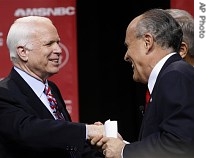-
(单词翻译:双击或拖选)
Washington
04 May 2007
Iraq, Iran and Hillary Clinton were major topics of discussion in the first Republican presidential candidates debate, held Thursday in California. VOA National correspondent Jim Malone has more on what this first debate tells us about the Republican presidential field from Washington.
As expected, all but one of the ten Republican contenders expressed support for President Bush's strategy in the war in Iraq.
But most of them also took a very tough line on the government in Iran. Arizona Senator John McCain was one of several candidates who said the United States must be prepared to confront Iran over its potential nuclear weapons capabilities1.
"My greatest fear is that the Iranians acquire a nuclear weapon and give it to a terrorist organization and there is a real threat of them doing that," he said.
McCain has emerged as perhaps the most vocal2 Republican candidate in support of the U.S. troop surge strategy in Iraq.
But McCain also noted3 during the debate that the U.S. badly mismanaged the Iraq war for four years.
That theme of criticizing the Bush administration for its handling of Iraq combined with a commitment to continue the U.S. military effort there was echoed by former Arkansas Governor Mike Huckabee.
 |
| Republican presidential hopefuls John McCain, left, and Rudy Giuliani greet each other after the first republican presidential primary debate of the 2008 election, 3 May 2007 |
The only exception to the tough talk about Iraq and Iran came from Texas Congressman6 Ron Paul.
Paul describes himself as an old fashioned conservative Republican who opposes a powerful role for the federal government in shaping both domestic and foreign policy.
"I am suggesting very strongly that we should have a foreign policy of non-intervention," he said.
Paul and some of the other lesser-known contenders struggled to gain the spotlight7 as they competed with the likes of former New York City Mayor Rudy Giuliani.
Giuliani has led the Republican presidential field in public opinion polls for months, based largely on the leadership he demonstrated in the aftermath of the 2001 terrorist attacks on New York, Washington and Pennsylvania.
But Giuliani's views on some domestic issues have already brought opposition8 from social conservatives, a key activist9 group within the Republican Party.
During the debate, Giuliani was the only one of the candidates to express support for abortion10 rights.
"In my case, I hate abortion," he said. "I would encourage someone to not take that option. But ultimately since it is an issue of conscience, I would respect a woman's right to make a different choice."
Giuliani's lead in the polls has dipped in recent weeks. Pollster Peter Brown of Quinnipiac University in Connecticut says Giuliani's moderate position on social issues may be costing him support.
"There are many within the Republican Party who think the fact that Mayor Giuliani supports abortion rights, has supported gay rights and is supporting gun control makes him not the type of candidate that usually wins Republican primaries," he explained. "And it may well be that those attacks are starting to bear some fruit."
Several political analysts11 and commentators12 who watched the debate said former Massachusetts Governor Mitt13 Romney may have gained the most from the forum14 because, in their view, Romney looked the most presidential of the ten contenders.
Romney is less well known than McCain and Giuliani, but he runs third among active candidates in most of the polls. But those same surveys also indicate concern about Romney's membership in the Mormon Church, an issue he addressed during the debate.
"This is a nation, after all, that wants a leader who is a person of faith, but we do not choose our leader based on which church they go to," he said.
One issue all the Republican contenders seem to agree on was their desire to keep Democrat15 Hillary Clinton from winning the presidency16 next year. Asked about the prospect17 of former President Bill Clinton returning to the White House if his wife won the election, the Republican candidates responded with laughter.
 收听单词发音
收听单词发音
1
capabilities

|
|
| n.能力( capability的名词复数 );可能;容量;[复数]潜在能力 | |
参考例句: |
|
|
|
2
vocal

|
|
| adj.直言不讳的;嗓音的;n.[pl.]声乐节目 | |
参考例句: |
|
|
|
3
noted

|
|
| adj.著名的,知名的 | |
参考例句: |
|
|
|
4
disastrous

|
|
| adj.灾难性的,造成灾害的;极坏的,很糟的 | |
参考例句: |
|
|
|
5
chaos

|
|
| n.混乱,无秩序 | |
参考例句: |
|
|
|
6
Congressman

|
|
| n.(美)国会议员 | |
参考例句: |
|
|
|
7
spotlight

|
|
| n.公众注意的中心,聚光灯,探照灯,视听,注意,醒目 | |
参考例句: |
|
|
|
8
opposition

|
|
| n.反对,敌对 | |
参考例句: |
|
|
|
9
activist

|
|
| n.活动分子,积极分子 | |
参考例句: |
|
|
|
10
abortion

|
|
| n.流产,堕胎 | |
参考例句: |
|
|
|
11
analysts

|
|
| 分析家,化验员( analyst的名词复数 ) | |
参考例句: |
|
|
|
12
commentators

|
|
| n.评论员( commentator的名词复数 );时事评论员;注释者;实况广播员 | |
参考例句: |
|
|
|
13
mitt

|
|
| n.棒球手套,拳击手套,无指手套;vt.铐住,握手 | |
参考例句: |
|
|
|
14
forum

|
|
| n.论坛,讨论会 | |
参考例句: |
|
|
|
15
democrat

|
|
| n.民主主义者,民主人士;民主党党员 | |
参考例句: |
|
|
|
16
presidency

|
|
| n.总统(校长,总经理)的职位(任期) | |
参考例句: |
|
|
|
17
prospect

|
|
| n.前景,前途;景色,视野 | |
参考例句: |
|
|
|















